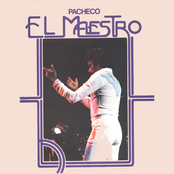El Maestro

Biography
Johnny Pacheco (born March 25,1935 in Santiago de los Caballeros, Dominican Republic) is an Afro Dominican producer, musician, bandleader, and one of the most influential figures in salsa music. Pacheco inherited his passion for music from his father, Rafael Azarias Pacheco, who was the bandleader and clarinetist of the “Santa Cecilia Orchestra”. In the late 1940s, when Pacheco was 11, his family moved to New York City from his native Dominican Republic. He continued polishing his musical skill...
Johnny Pacheco (born March 25,1935 in Santiago de los Caballeros, Dominican Republic) is an Afro Dominican producer, musician, bandleader, and one of the most influential figures in salsa music.
Pacheco inherited his passion for music from his father, Rafael Azarias Pacheco, who was the bandleader and clarinetist of the “Santa Cecilia Orchestra”. In the late 1940s, when Pacheco was 11, his family moved to New York City from his native Dominican Republic. He continued polishing his musical skills, learning to play accordion, violin, saxophone and clarinet. He attended the Juilliard School of Music to study percussion.
Playing the flute, saxophone and assorted percussion, Pacheco performed with Charlie Palmieri‘s Latin orchestra for a number of years before forming his own band in 1959. Experimentation was the focus of his new band, blending African music of Cuban, Dominican, and Puerto Rican heritage into what came to be known as salsa.
In 1960, he organized his first orchestra, “Pacheco y Su Charanga”. The band signed with Alegre Records and its first album “Johnny Pacheco y Su Charanga” sold over 100,000 copies within the first year. Beginning then and through the end of 1963, Pacheco introduced a new dance craze called “Pachanga”. He became an internationally renowned star and toured extensively throughout the United States, Europe, Asia, and Latin America. Moreover '"Pacheco y Su Charanga", was the first Latin band to headline the Apollo in 1962 and 1963.
The early Fania All-Stars band was made up of Johnny Pacheco, musical director and flute; Larry Harlow on piano, Bobby Valentin on bass guitar, Ray Barretto on conga, (replaced by Eddie Montalvo later on) Roberto Roena on bongo, Orestes Vilato on timbales, (replaced by Nicky Marrero later on); Willie Colón, Barry Rodgers, and Renaldo Jorge(replaced by several others) on trombones, Larry Spencer , Roberto Rodriguez (replaced by Victor Paz) and Hector “Bomberito” Zarzuela on trumpets, and Yomo Toro on the cuatro (a small Puerto Rican guitar with ten strings). The lead singers included vocalists from the Colon, Pacheco, Barretto and Harlow bands. Hector Lavoe, Pete "El Conde" Rodriguez, Adalberto Santiago, Ismael Miranda, were joined by Santitos Colon (from the Tito Puente band) and Jose Cheo Feliciano (from the Joe Cuba band). Early Fania All Stars guests were Eddie Palmieri, Tito Puente, Joe Bataan, Monguito, Mongo Santamaria, Jimmy Sabater, La La, Louie Ramirez, Ralph Robles, Yomo Toro, Nicky Marrero, Ricardo Richie Ray and Bobby Cruz. The 1970’s line-up included Rubén Blades, Celia Cruz, Papo Lucca, Eddie Palmieri, Andy Montañez, Jorge Santana (Carlos’s brother), drummer Billy Cobham and the Cameroonian sax player Manu Dibango, who appeared as a guest in concerts and live recordings in Africa and New York.
Read more on Last.fm. User-contributed text is available under the Creative Commons By-SA License; additional terms may apply.
